Introduction
This article highlights the challenges new managers and leaders face after transitioning to a new role and shares ways to overcome the negative impacts of such challenges on the organization.
You've just promoted someone into a leadership role within your digital agency, or maybe you've brought in fresh talent from outside.
Either way, this new leader is now responsible for guiding a team through high-stakes projects and delivering results your clients expect.
You know that the success of your projects—and possibly your client relationships—depends on how quickly and effectively this manager can adapt and lead. And so does this person in the hot seat.
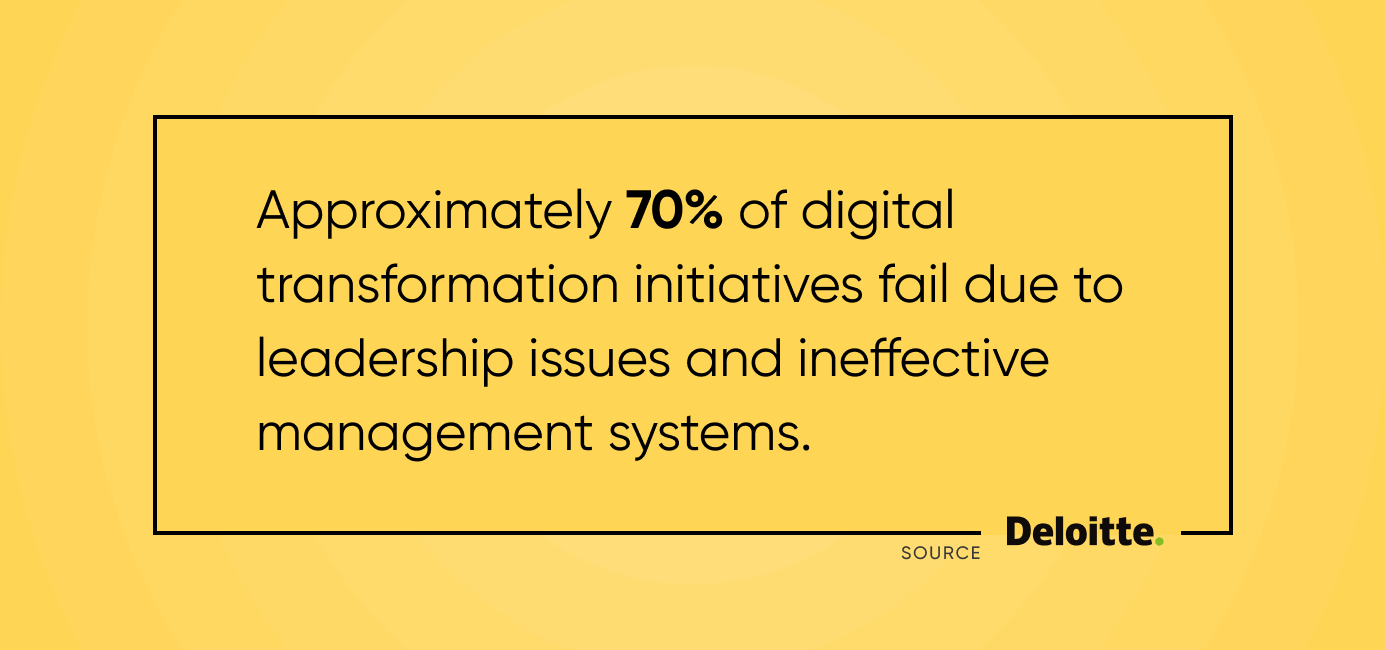
The pressure can be stunning. Even the most talented hires can struggle with such high-stakes transitions if they don’t have the right support.
Chances Are, The New Manager Is Already Struggling With These Challenges
Taking on a leadership role in a digital agency is a challenge that comes with high stakes and little room for error.
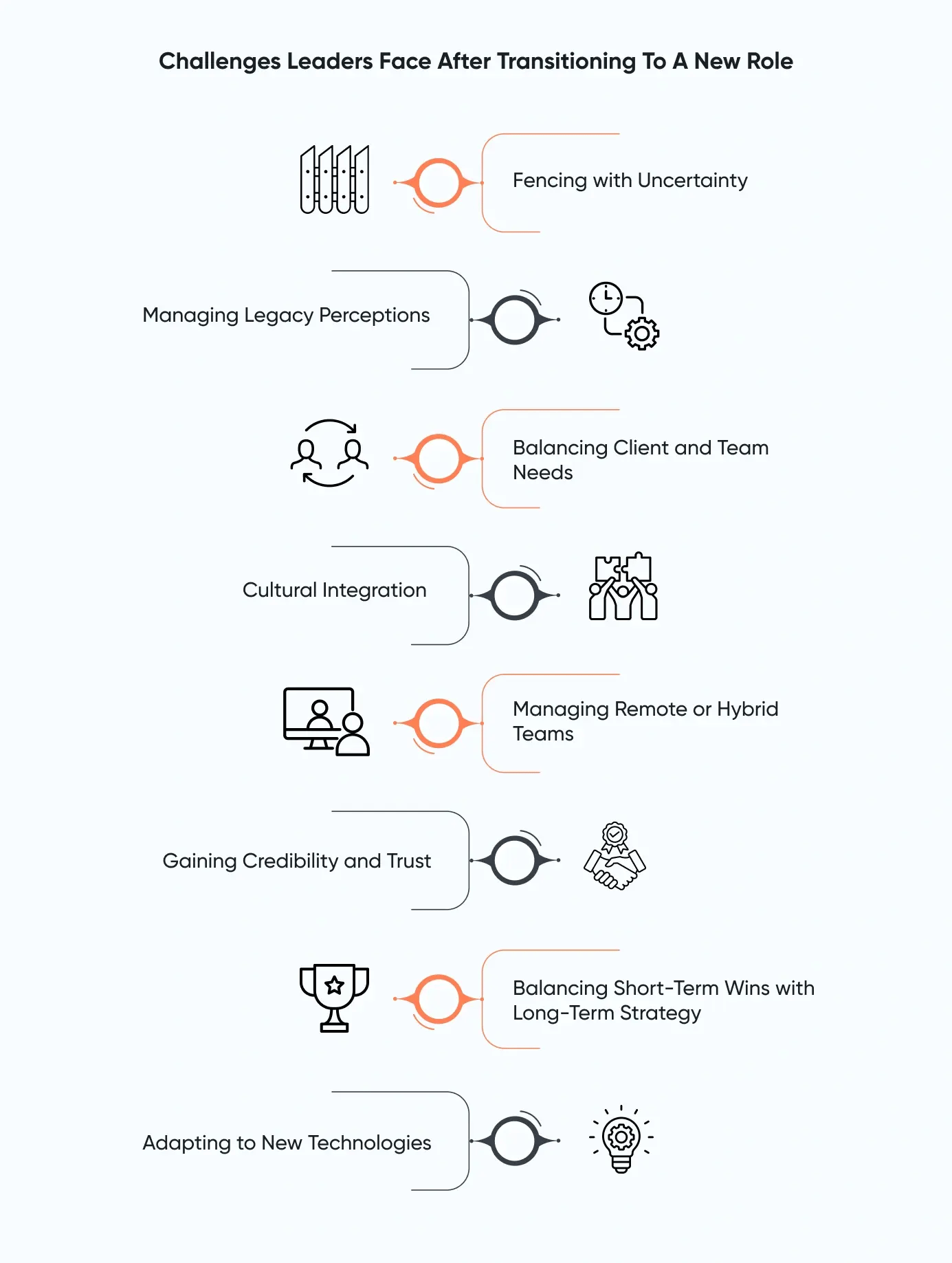
New managers, whether promoted internally or hired externally, often find themselves in a whirlwind of expectations, trying to establish authority while simultaneously learning the ropes.
Here are some specific challenges these new managers face.
Fencing With Uncertainty
One of the first obstacles new managers encounter is the uncertainty that comes with stepping into a leadership role.
They’re expected to hit the ground running from day one, but understanding the nuances of team dynamics and getting up to speed with ongoing projects takes time.
This learning curve can create a sense of vulnerability, as they may feel pressured to prove themselves before they fully grasp the complexities of their new environment.
This is particularly critical, as a Deloitte study found that approximately 70% of digital transformation initiatives fail due to leadership issues and ineffective management systems.
Managing Legacy Perceptions
Another significant hurdle is managing the existing perceptions or expectations that the team might have from their previous manager.
If the former leader was well-liked or had a particular style, the new manager might struggle with gaining acceptance, especially if they bring a different approach.
Brayn Robinson, author of Chained to the Desk in a Hybrid World, found in his research that nearly 66% of employees prefer being managed by someone promoted internally rather than an external hire, exposing a strong bias towards familiarity.
This preference can make it especially harder for new, external managers to build trust and rapport.

Balancing Client And Team Needs
In a client-focused project, balancing the needs of both the client and the team can be a tightrope walk.
New managers often find themselves pulled in two directions—on one hand, they need to meet client demands, which can sometimes require pushing the team to their limits.
On the other hand, they’re responsible for maintaining team morale and ensuring that the workload is sustainable.
The manager or leader needs advanced emotional and behavioral skills to create and maintain that fine balance.

How Does A Failed Transition Hurt Your Agency’s Growth
When a new manager struggles to integrate with their team, the ripple effects can impact everything, from team morale to client relationships.
A failed transition doesn’t just affect the individual—it can derail projects and undermine the agency's growth.
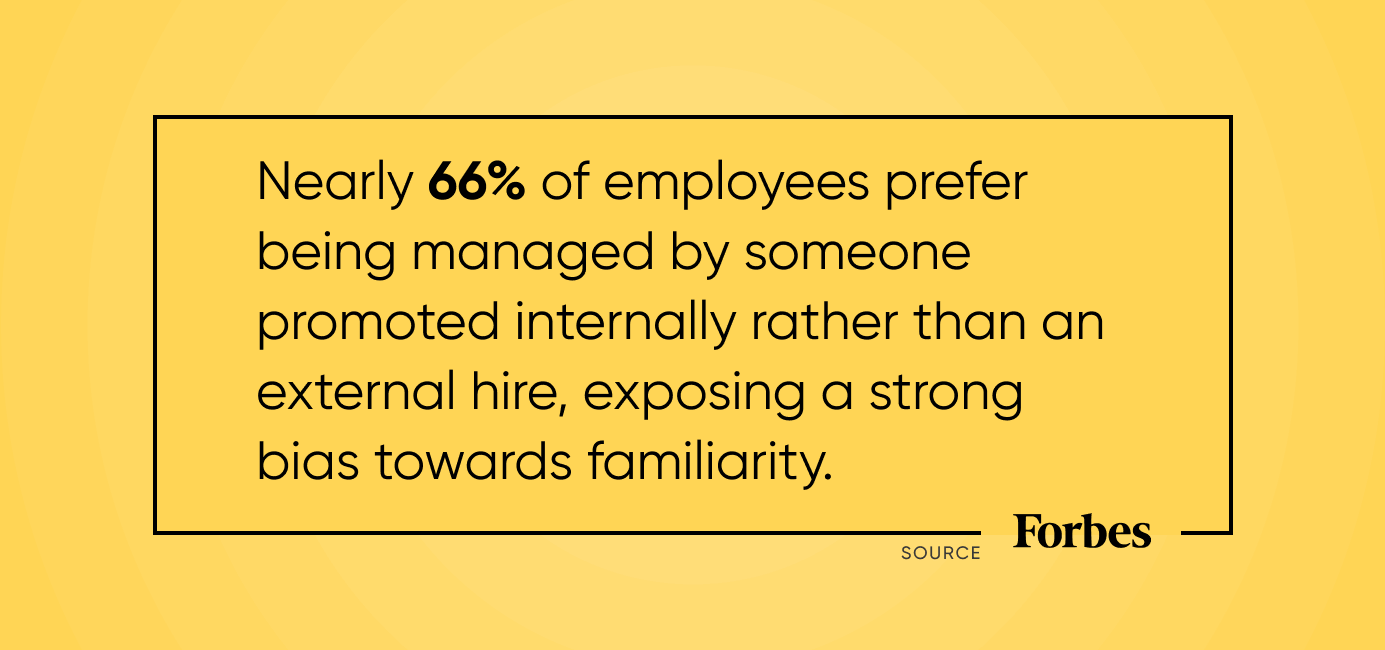
Decreased Team Morale
Misalignment between a new manager and the team can quickly lead to disengagement and lower morale.
When employees feel disconnected from leadership, they are less motivated to perform and may actively become resistant to the leader’s authority, which can create a toxic environment.
This is especially true if the team perceives the manager as someone lacking the skills or experience needed to lead effectively.
Project Delays and Quality Issues
The impact of poor team dynamics extends beyond morale.
Projects are often delayed, and quality suffers when there is a lack of cohesion between the manager and the team.
In fact, a 2024 Pulse of the Profession report highlights that strong team collaboration and communication are essential for project success.
Organizations that invest in providing support resources like mentoring and coaching their project managers are 25% more likely to achieve project success.
A lack of team cohesion can lead to missed deadlines and compromised deliverables, putting client relationships at risk.
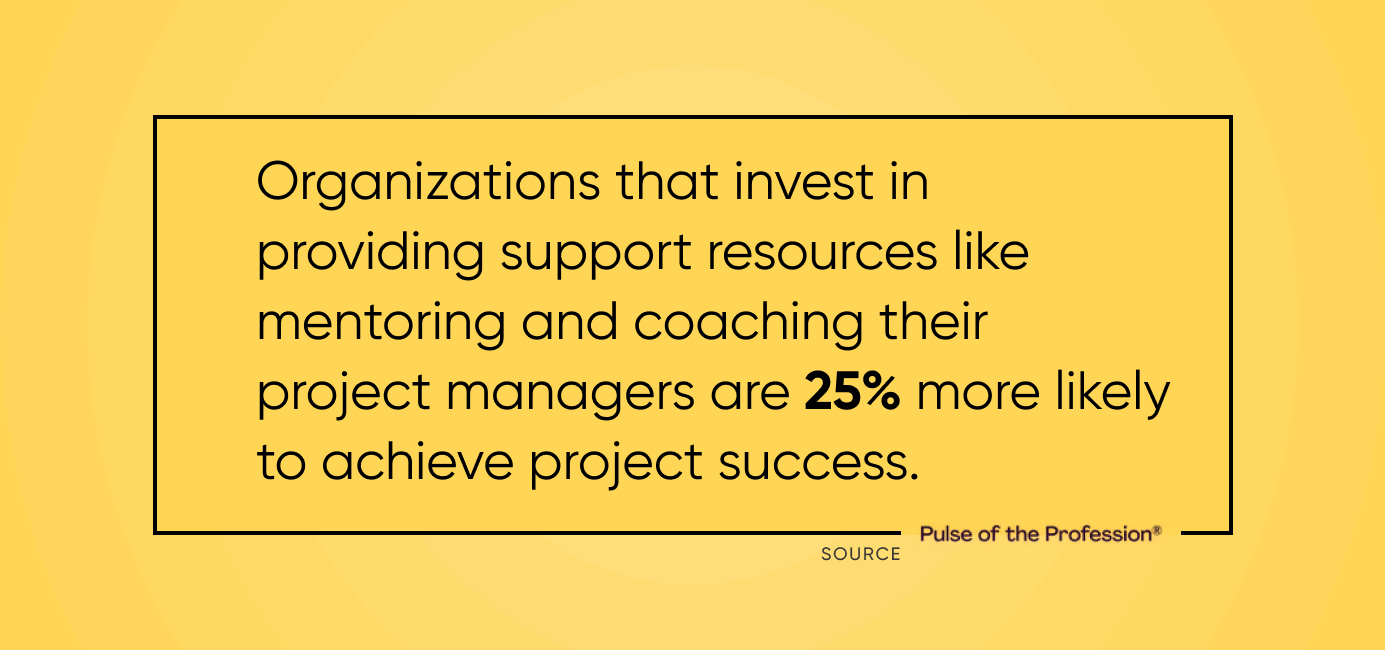
Client Dissatisfaction
Clients expect smooth project execution, and when there are delays or quality issues, their confidence in the agency falters.
Poor management transitions can disrupt project delivery, leading to decreased client engagement and satisfaction.
Gallup research shows that only 29% of B2B customers remain fully engaged, but companies that deliver consistent and effective management see 72% more fully engaged customers.
This higher engagement directly translates to increased client satisfaction, higher loyalty, repeat business, and positive word-of-mouth.
Increased Organizational Costs
The hidden costs of a failed transition can be significant: conflict resolution, increased turnover, and lost productivity all add up.
The Society for Human Resource Management discovered replacing employees due to poor leadership can cost companies up to 150% of the employee’s salary.
These costs aren't just financial—they also drain time and resources, further stalling the agency’s growth.
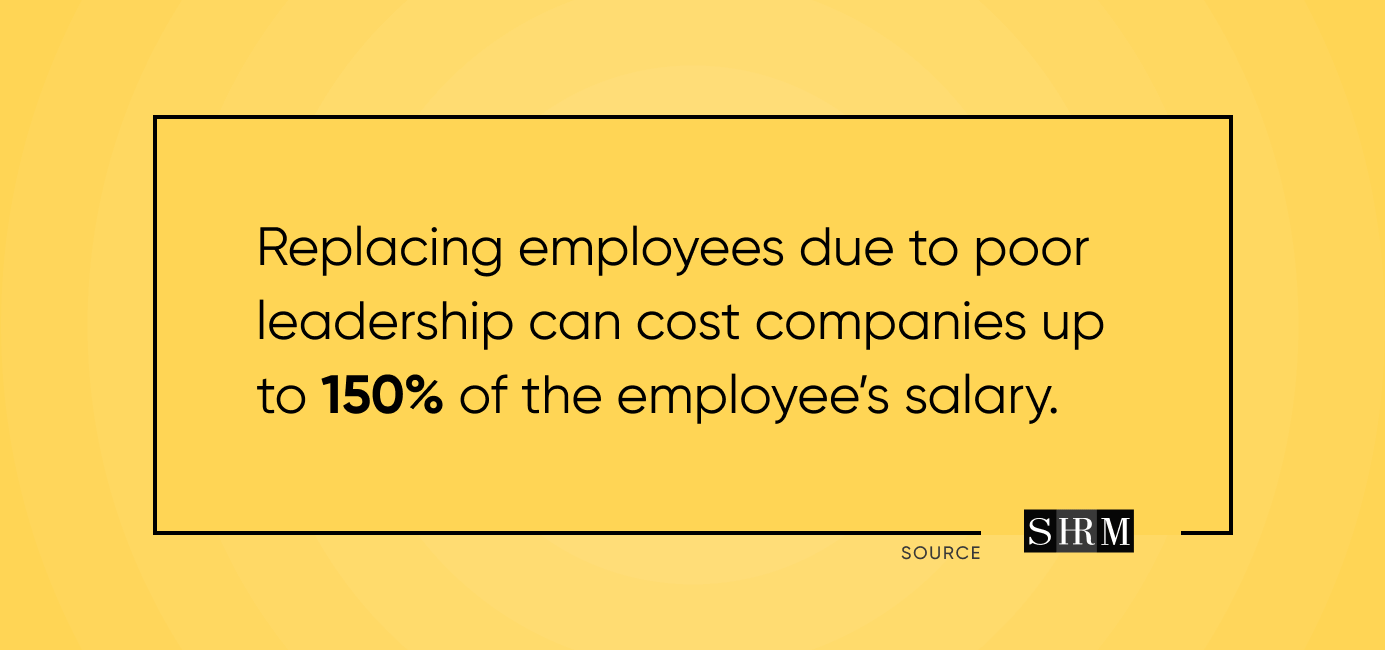
Damage to Leadership Reputation
Finally, a failed transition also reflects poorly on the organization’s leadership and development practices.
When leadership transitions are mishandled, it can signal to both current employees and potential hires that the company lacks the support system necessary for successful leadership.
And we all have seen the consequences of such ill perceptions on bulletin boards of websites like Glassdoor and Ambition Box.
This reputational damage can make it harder to attract and retain top talent, further hindering growth.
Read more on how authoritative leadership can hurt your agency's growth.
How Does 1-on-1 Performance Coaching Ensure Successful Leadership Transitions
By focusing on key challenge areas, 1-on-1 coaching equips new managers with the skills and tools to navigate hurdles and lead their teams with confidence.
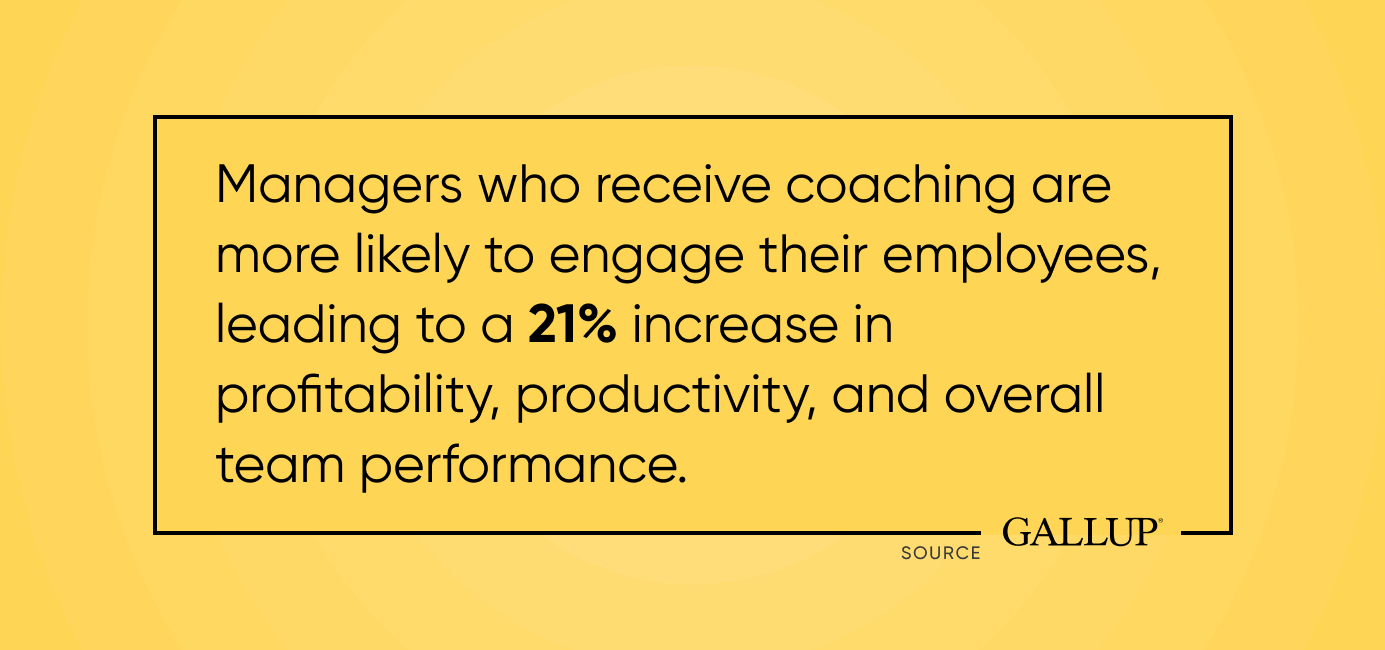
Skill Development
Coaching plays a crucial role in developing the skills new managers need to succeed. This includes:
- Decision-Making: Learning how to make informed decisions under pressure is vital for leading effectively
- Communication: Clear and concise communication prevents misunderstandings and fosters a collaborative team environment
- Conflict Resolution: Handling conflicts swiftly and fairly ensures that team dynamics remain positive and focused on the goals at hand
These core skills are essential for new managers to overcome the challenges of leadership transitions.
Building Confidence
Confidence is a key trait for any successful leader. Coaching provides:
- Constructive Feedback: Regular feedback helps managers understand their strengths and areas for improvement, which boosts their confidence
- Supportive Environment: A coach offers a safe space for new leaders to express concerns and test new strategies, helping them feel more assured in their decisions
This confidence translates into decisive leadership, which is crucial for navigating complex projects and team dynamics.
Personalized Guidance
Every manager's situation is unique, and coaching offers:
- Tailored Strategies: Coaches provide customized approaches that align with the manager’s specific challenges and the needs of their team
- Focused Development: Coaching targets the areas where a manager needs the most support, whether it’s team communication, project management, sharpening behavioral skills, or handling client expectations
This personalized approach ensures that coaching addresses the exact needs of the manager and the agency, leading to more effective leadership.
Building Resilience and Adaptability
Leadership transitions are filled with unexpected challenges.
1-on-1 coaching helps new managers develop the resilience and adaptability needed to handle these situations effectively.
By teaching leaders how to stay calm under pressure and pivot when necessary, coaching ensures that they can weather any storm, maintaining stability within their teams and projects.
Discover how direct coaching can maximize your team's potential like never before.
Empowering Leaders to Build Trust
Trust is the foundation of any successful team.
Coaching empowers new managers to foster trust within their teams by improving communication, demonstrating reliability, and supporting their team members’ growth.
When leaders build trust, they create an environment where team members feel valued and motivated, leading to better collaboration and overall performance.
In fact, a study by the International Coaching Federation (ICF) found that 86% of companies recouped their investment in coaching, with executives showing a 22% improvement in performance and leadership effectiveness.
This underscores the tangible benefits of coaching, not just for individual leaders but for the organization as a whole.

Actions That Can Supercharge Team Dynamics
To ensure successful leadership transitions, new managers must focus on actions that build trust, cultivate positive relationships, and promote a growth mindset within their teams.
Here’s how they can do that:
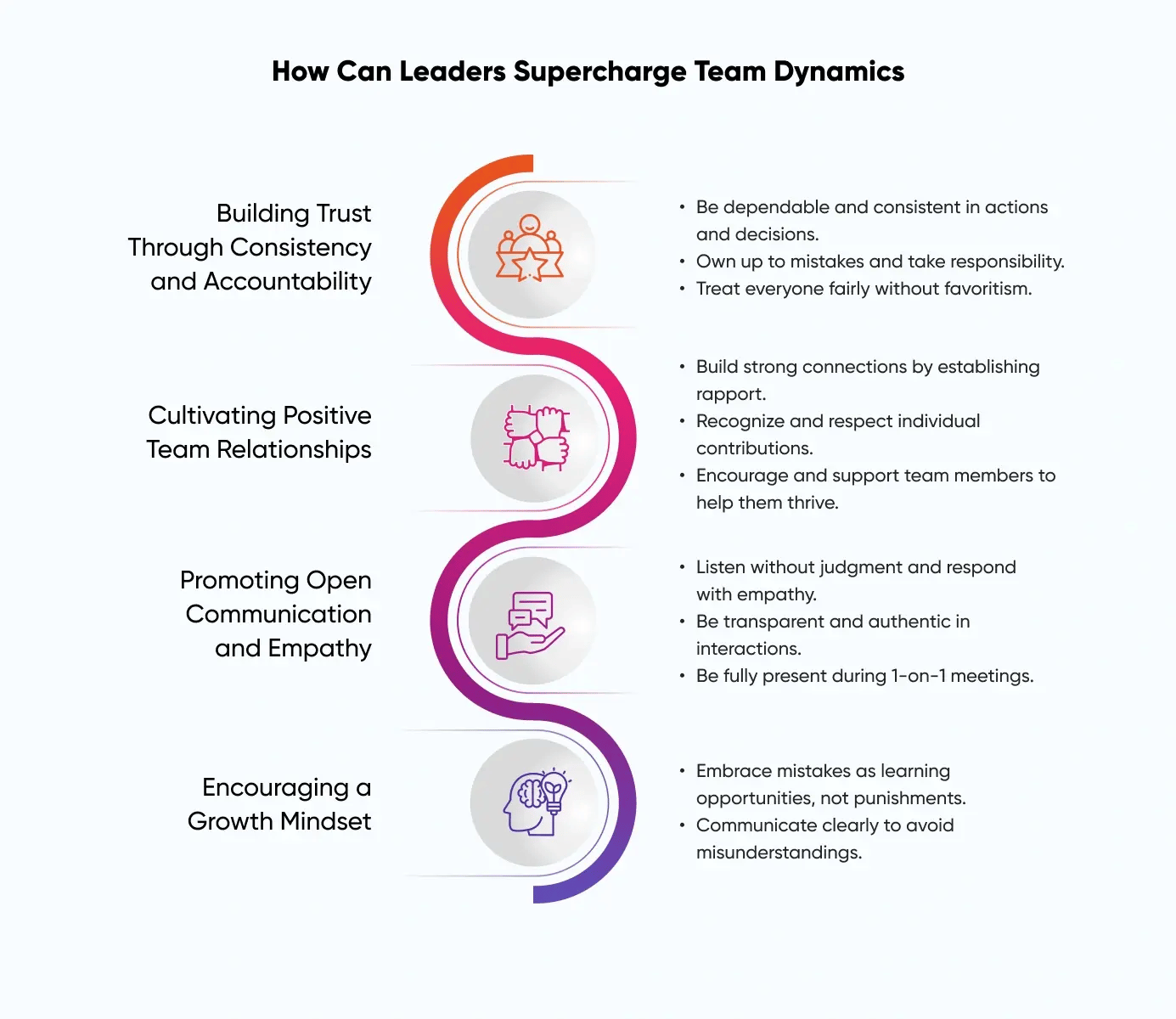
Building Trust Through Consistency and Accountability
- Consistency: Leaders should be dependable and consistent in their actions and decisions. When team members know they can count on their leader, trust naturally grows
- Taking Responsibility: It's important for leaders to own up to their actions and decisions, especially when things go wrong. Accountability builds credibility and trust within the team
- Fairness: Treating everyone on the team fairly and without favoritism ensures that all team members feel valued and respected. Decisions should be based on merit, and everyone should be given a fair chance
Cultivating Positive Team Relationships
- Establish Good Rapport: Building strong connections with team members creates a supportive and collaborative environment. Leaders should invest time in getting to know their team on a personal level
- Treat Team Members Like People, Not Resources: Recognizing and respecting individual contributions, as well as personal needs, fosters loyalty and engagement within the team
- Encouragement: Leaders should motivate and support their team members, showing belief in their abilities. When people feel valued, they are more likely to perform at their best
Promoting Open Communication And Empathy
- Suspend Judgment, Deeply Listen with Empathy: Understanding your team’s perspectives and concerns is crucial. Leaders should focus on listening without judgment and responding with empathy
- Be Vulnerable and Open: Encouraging transparency and authenticity in interactions builds deeper connections and trust
- Be Fully Present During 1-1s: Leaders should focus on meaningful communication during individual meetings, showing their team members that they are valued and heard
Encouraging A Growth Mindset
- Delete the Mindset of Mistake = Punishment: Embracing mistakes as opportunities for learning and growth creates a psychologically safe environment where innovation can thrive
- Clarity: Clear and effective communication prevents misunderstandings and ensures that everyone is on the same page, reducing the risk of mistrust and conflict

Empower Your Leaders To Drive Agency Growth
Leadership transitions can make or break your agency’s success.
By equipping your leaders with the right tools and via training through 1-on-1 performance coaching, you can ensure that they lead with confidence, cultivate strong team dynamics, and drive growth.
I guess the question remains: Do you want the next leadership transition in your agency to be a catalyst for growth, or a stumbling block?

Rohit Ganguly, Content Marketer
Rohit is a content marketer first and a YouTuber second. He loves to interact with animals, feed them, clean his apartment, and spend time with friends and family. Curious by nature, he also enjoys literature, movies, meditation, and calligraphy.

 We respect your privacy. Your information is safe.
We respect your privacy. Your information is safe.



Leave us a comment